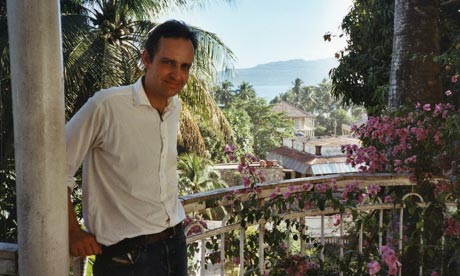
For all its promise of sun and tropical hedonism, Jamaica is a land with a continuous memory of slavery. The island was once the brightest jewel in the British slave colonies: a prize and inhumane possession. Slavery runs through Jamaican life today like the black line in a lobster.
In 2007, I visited a white planter in the west of the island, known locally as "Squire" Cooke. He was rumoured to live reclusively in Chester Castle, which had reportedly gone wild, "gone back to bush". There was no telephone. So if I wanted to visit, I would have to do so unannounced.
Up the hill to the old slave mansion the bamboo groves radiated a jewel-like lustre; not for the first time Jamaica struck me as beautiful. The locals called this a wild place: a green light filtered eerily through the forest canopy. Before long, I was standing outside a West Indian merchant's house of the mid-1700s. Built of cut stone, it stood shuttered and silent in the afternoon heat. A Land Rover lay abandoned in the tractor yard, its chassis white with bird droppings.
The door was opened for me by an elderly man in dungarees, who introduced himself as Mr Dixon. "Master Cooke's asleep," he announced. "But he soon come."
And with that he disappeared into Chester Castle, leaving me to wait outside. For almost an hour I waited before Cooke emerged from his slumbers. A thin man bent almost double with age, he punted himself towards me with the aid of a bamboo pole. "What brings you to Jamaicaaah?" he asked, the vowels peculiarly drawn-out. Though haggard and distrait, Cooke was still every inch the buckra, or Jamaican planter. His face had the waxy pallor of white men who have lived long in the torrid zone.
He gestured for me to sit down in a room panelled in dark timbers that smelled faintly of beeswax and lamp-paraffin. There was little furniture to speak of other than a couple of broken Windsor chairs and a leather-seated armchair visibly attacked by termites. Cooke said his daughter had come out from England the other day and, staking her claim to the family furniture, "cleared out everything" with a removal man. He added (apparently by way of apology) that she lived in Tunbridge Wells.
Impressively, the Cookes had lived in Chester Castle since 1773; no doubt, like many of Jamaica's long-settled English, they had been impervious to, and contemptuous of, the slave culture in which they found themselves. Cooke was friendly, though, and his hospitality freely offered. He said he had been educated in England, but England must have seemed quite unreal to him now. Upstairs, the rooms had collapsed; tubers and shoots were pushing through the floorboards and broken windows. A mattress lay along one wall, next to a pail for collecting rain.
"It breaks my heart to have to depart this island which I love so," Cooke said, adding, "I'm 96. Yes, I'm so old that it's almost senseless for me to die. But die I must, very soon, and now that my furniture's gone, dying will be my final act of dispossession." Six generations of Cookes lay buried nearby in Bethel Town churchyard, "and I hope to join them before long".
Cooke got up and, using his chair as a walking frame, propelled himself down the hall towards the veranda, which overlooked a green ocean of cane fields. "When you get to my age you accumulate a lot of regrets," he went on. "And one of my chief regrets is that I was never able to paint this . . . magnificent view." Away in the distance, behind a curtain of fan palms, a smudge of white indicated Montpelier House, a Cooke estate "saved" from the Jamaican slave uprising of 1831-2. Cooke stared dolefully at the bright Eden spread out before us.
Would I care to hold a telescope to the view? "Rose! Dixon!" Cooke called out. "Where's my spyglass?" The servants looked, but no telescope could be found. "It's gone the way of all flesh," Cooke said, his voice thick with emotion. "Oh, it breaks my heart to have to depart this island which I love so. I've seen some extraordinary things here – I've seen the sky darken with butterflies, oh yes, the butterflies actually kaleidoscoped the sky. Now there are no more butterflies left."
The world had been reduced to this: an old man in an abandoned house on a hill. Cooke was born here almost a century earlier, the last of his kind in Jamaica. And Chester Castle, like Cooke, was at the end of its existence. I left him in the home of his slave-owning forebears, oddly moved by the encounter, and returned to the forest path as the sun sank over Jamaica.
• British Airways (0844 493 0 787) flies from Gatwick to Montego Bay. Until 20 July there is a seat sale with fares available from £447.40 return including taxes. Tensing Pen, set in a private cove in West End, Negril, has 22 thatched cottages of varying sizes, starting from £75 per night for a garden cottage for two people. For further information see visitjamaica.com
Ian Thomson's The Dead Yard: A Story of Modern Jamaica (Faber) won the 2010 Royal Society of Literature Ondaatje Prize and the Dolman Travel Book Award

